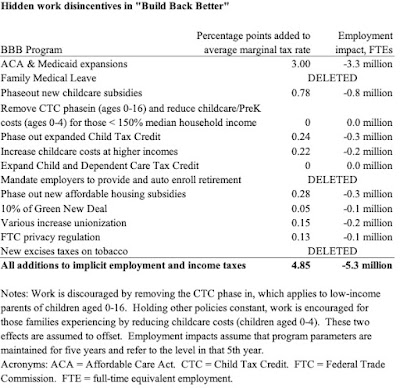Hidden Work Disincentives
I had been tracking 13 types. Three disappeared from today’s revised bill. The Medicaid expansions appear to be less. Affordable housing was cut in half (still at $150B). Dems once aspired to allow union dues to be tax deductible but that was cut. Many other pro-union provisions remain.
The new childcare program has now replaced an income phaseout above 250% median income with a cliff. This change from last month’s bill to lastest draft has little effect on the average marginal tax rate because the same funds are being phased out over a narrower range. I.e., a few people see very large additions to their marginal tax rate while others disincentivized with a phaseout now see no addition.
The “green energy” provisions have a lot of producer-protectionist elements in them, which add to the labor wedge much like excise taxes do. However, the green energy provisions were scaled back in today’s revision.
The Obamacare expansion (pp. 1458ff) is a bit more aggressive than last month’s BBB bill. The revision stops indexing — ie health insurance gets more expensive over time and it is 100% taxpayer problem rather than plan members’.
My summary of marginal-tax-rate and employment effects are shown in the table below. More derivations are available in my report although that report refers to last-month version.

Hidden Marriage Disincentives
Replacing the childcare phaseout with a cliff increases the (already remarkably large) marriage disincentive because even a father with moderate earnings will, if he joins the family, push them beyond the range of eligibility. I.e., the family with married parents will likely be paying full price. The various, and extreme, provisions to inflate the full price of childcare remain in the revised bill.
Pharma scores two wins
The news came out early that this bill would not have prescription-drug price controls. But it also allows Trump’s terrible rebate rule to continue. Even Biden was expecting the revised bill to contain a repeal, with much savings in corporate welfare that could be put toward “transforming America.” Should I start calling it “Biden’s terrible rebate rule”?
Employers are still the enemy
The revision maintains the directive for OSHA to increase employer fines by at least 10X (Section 21004). Among other things, a private-sector employer with an unvaccinated employee on the payroll will be punishable by a fine of up to $1,365,320 PLUS up to $136,532 per day that employment continues (yes, $51 million per employee per year; note that the statute dictates specific amounts and that the amounts be annually indexed). This far exceeds the social cost, if any, of employing such a person.
However, revised bill does not mandate employers to provide retirement accounts. I am expecting this onerous mandate to show up in the new retirement bills introduced this week in House and Senate, but for now this element of freedom remains in employer-employee relations.